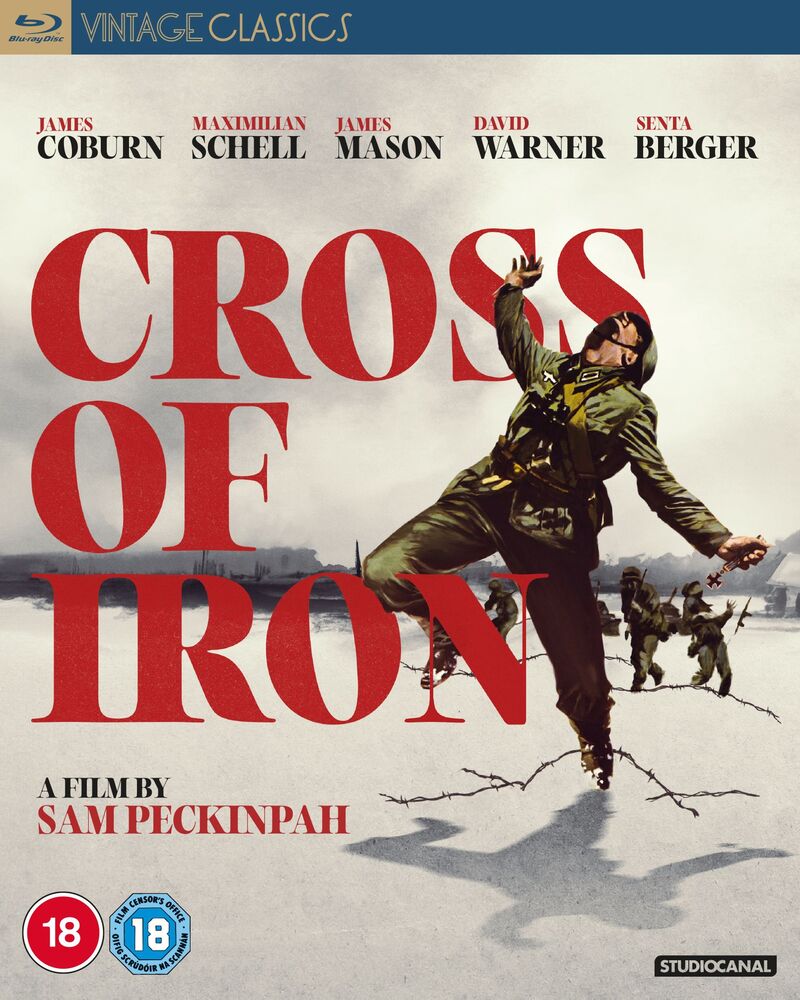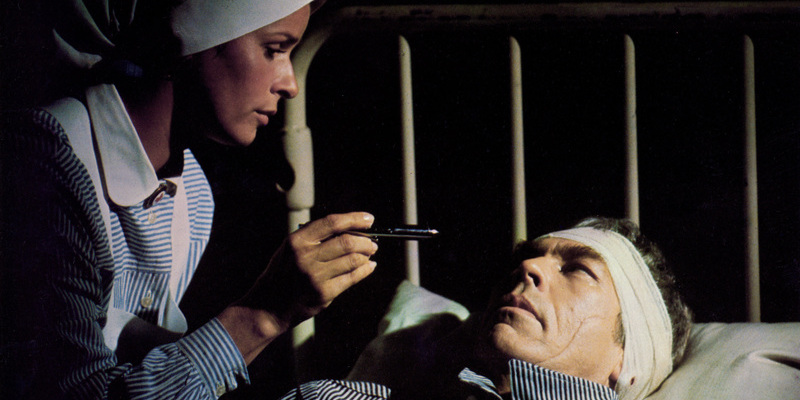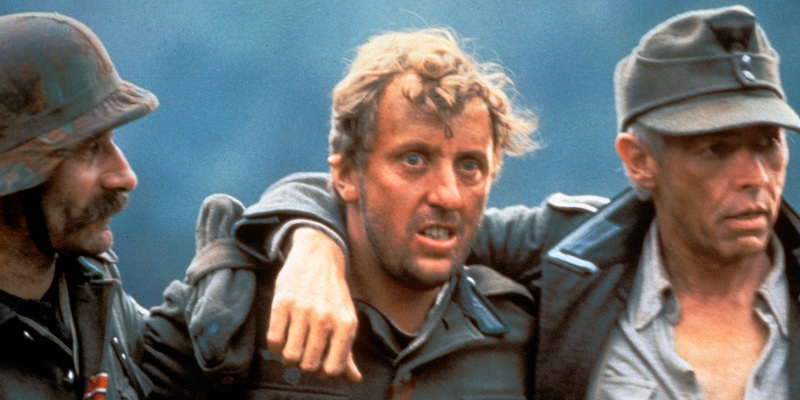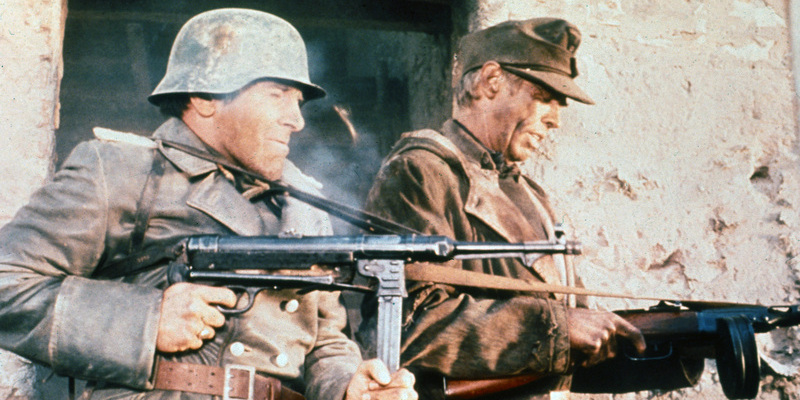
On the Russian front of 1943, a German soldier is betrayed and left for
dead by his commanding officer.
Review by
Eric Hillis
Directed by: Sam Peckinpah
Starring: James Coburn, Maximilian Schell, James Mason, David Warner, Senta
Berger

"If we ignore a problem it will hopefully go away" is the unofficial
motto of Northern Europe. It's an attitude the German film industry took
to depicting the Second World War through most of the decades since that
conflict. While many Italian filmmakers interrogated their country's
slide into fascism, their German counterparts were either unwilling to
do so or perhaps more likely, were hamstrung by the rules Germany
implemented regarding depictions of Nazism in a classic case of sweeping
an issue under the carpet. The German public clearly had an appetite for
seeing their darkest hour portrayed on screen however, as when
Sam Peckinpah's Cross of Iron was released in the
country in 1977 it became the German box office's biggest hit since
The Sound of Music.
Co-financed by German producers, Peckinpah found himself restricted in
what he could depict on screen. There are no visible swastikas to be
found in the film, and Hitler is never mentioned by name, only referred
to as "the bastard" in the Bertolt Brecht quote that closes out the
film. Indeed, there are no references to Nazism whatsoever, despite the
movie's protagonists being members of the German army, fighting on the
Russian Front. Yet these restrictions only serve to enhance the central
theme of Peckinpah's film, which was adapted from
Willi Heinrich's novel 'The Willing Flesh'. It could be argued
that none of the German men featured here are Nazis, that they have
other motives for fighting. Some are in it for the glory. Others are
just trying to survive.

The former group is represented by Stransky (Maximilian Schell),
a cowardly officer of aristocratic Prussian stock who feels entitled to
earn an Iron Cross without having to risk his life for it, and Brandt
(James Mason), an aging officer who is clearly on the frontlines
because war is in his blood and he probably views this conflict as a
chance to correct the mistakes of World War One. There's no indication
that either men share the philosophy of their Nazi superiors. They're
simply opportunists.
The survivors are led by the working class Corporal Steiner (James Coburn), who has no interest in earning medals. He doesn't seem to believe in
much of anything but he hates the men who give him orders, not because
he disagrees with their politics but because he simply hates authority.
You get the impression Steiner would make an enemy of a shop floor
supervisor if he was working in a Munich car plant. He does care about
the survival of his men, and even of Russian soldiers, if they happen to
be women and children, which they often are here. Early on he adopts a
captured Russian soldier who is no more than 12 years old into his
platoon, but his charity ends in tragedy, one of the grimmer notes in a
movie filled with reminders that war cares not for gestures of
humanity.

Steiner makes an enemy of Stransky when he refuses to lie about the
latter's cowardice during an assault by Russian soldiers. This leads to
Stransky getting revenge by leaving Steiner and his men trapped behind
enemy lines, with most of the film's second half detailing their
attempts to return to the (relative) safety of their own position. This
portion of the film plays like Come and See from the
German perspective, with Steiner witnessing horrors, some of which are
committed by the very men he set out to protect. His moral code leads
him to turn on his own men at points, including feeding a castrated
soldier to a group of female Russian soldiers eager to avenge the death
of one of their sisters.
Cross of Iron has much in common with the prison movie
genre. Steiner and his conscripted men are essentially inmates of an
open air prison, keeping their heads down and hoping they get to return
home some day. Stransky and Brandt occupy the classic prison movie roles
of the respectively sadistic and sympathetic wardens. There's even a nod
to homosexual relationships developing in this world without women,
represented by an officer who is blackmailed to take Stransky's side out
of fear of being exposed. Using homophobia as a villainous
characteristic was quite forward thinking for 1977.

As you would expect from Peckinpah, the film's action scenes are
intense and as memorable as any he created during his career. Peckinpah
captures the mayhem of the Russian Front, along with the apathy towards
death, with bodies falling mere metres from unperturbed men holding
conversations. At the time of its release some critics complained that
it was difficult to tell who was shooting at whom in the battle scenes.
But that's the point. It doesn't matter. This isn't a simplistic white
hats vs black hats movie. Peckinpah symbolises this through uniforms.
When the young Russian soldier is captured he's given a German coat to
keep warm, but it's ironically when he removes it that he's killed by
friendly fire from his own side. The movie's grim climax sees Steiner's
men clad in the uniforms of their enemy, becoming fair targets for the
officers who want rid of them. "Take off one uniform and there's always
another one underneath," Steiner intones at one point. Or as Brandt puts
it when asked what he'll do when Germany loses the war, "Prepare for the
next one."

